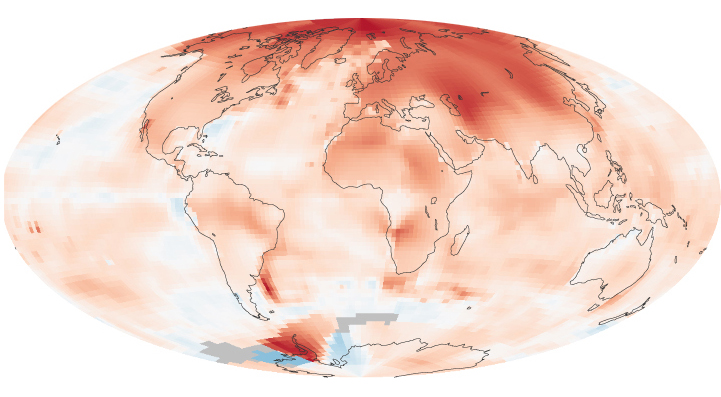Climate change happens when weather patterns change. This has happened a lot in the past and will continue to happen. It is a normal phenomenon. For example, the last cold period peaked approximately 18,000 years ago. This era is known as the Ice Age. After that, Earth’s climate began to warm again. Since the Industrial Revolution climate change has been happening very quickly. This period is known as “global warming.” There is one big difference between this period and the other periods of climate change that came before. The difference is that human beings have caused global warming.
This article is a plain-language summary of climate change. If you are interested in reading about this topic more in depth, please see our full-length entry, Climate Change.
Human Beings and Global Warming
Scientists have shown that since the Industrial Revolution, or late 1800s, human beings have produced a lot of carbon dioxide and methane. The primary way in which these gasses are produced is by burning fossil fuels. The main fossil fuels are coal, oil, and natural gas. Humans throughout the world have been using more and more coal, oil, and natural gas since the late 1800s. Carbon dioxide and methane are called “greenhouse gasses.” These gasses trap heat in the atmosphere. Thus, temperatures rise as a result. Some scientists predict that by 2050 the temperature of the Earth will be 2˚C higher than it was before the late 1800s. Others say that the temperature of the Earth will rise 2˚C more after that. Still other scientists predict that the Earth will become even warmer than this. These may seem like small increases, but they can lead to awful tragedies throughout the world.
Impact of Climate Change (Global Warming)
Climate change has contributed to drastically changing rivers, seas, and oceans. During the 20th century sea levels rose by approximately 20 cm. This occurred because of warming oceans and ice melting in polar regions. Scientists estimate that sea levels could become 1 m higher in the coming decades. This could devastate coastal cities like Vancouver and Halifax. Climate change can also cause heat waves, which can lead to droughts and crop failures. This means that the amount of available food will decrease. Climate change can also cause very strong storms and strange weather patterns. Therefore, it will be hard to predict the weather in the future.
Climate change will ultimately have a devastating effect on the world’s ecosystems. Plants and animals can be at serious risk. They will not have time to adapt to the changes in weather. This, again, can have very negative effects on human beings throughout the world.
What Can Be Done?
Climate change has worried scientists, politicians and global leaders everywhere. They have made several commitments to slowing down climate change. One of the first commitments was the United Nations Framework Convention on Climate Change in 1992. This was a treaty. It stated that we should work to ensure that greenhouse gasses will no longer pose a threat. In 2015, world leaders signed the Paris Agreement. The Agreement stipulated that governments and industries should limit the rising temperature of the planet. Almost 200 countries signed the Paris Agreement, including Canada.
One of the easiest solutions to climate change is for humans to limit their carbon footprint. Another is to make industries pay a carbon tax. This means they will have to pay taxes on the amount of carbon they produce. There are many other ways to stop or slow down climate change. Finding solutions to this problem is vital because it affects every single person on Earth.

 Share on Facebook
Share on Facebook Share on X
Share on X Share by Email
Share by Email Share on Google Classroom
Share on Google Classroom


